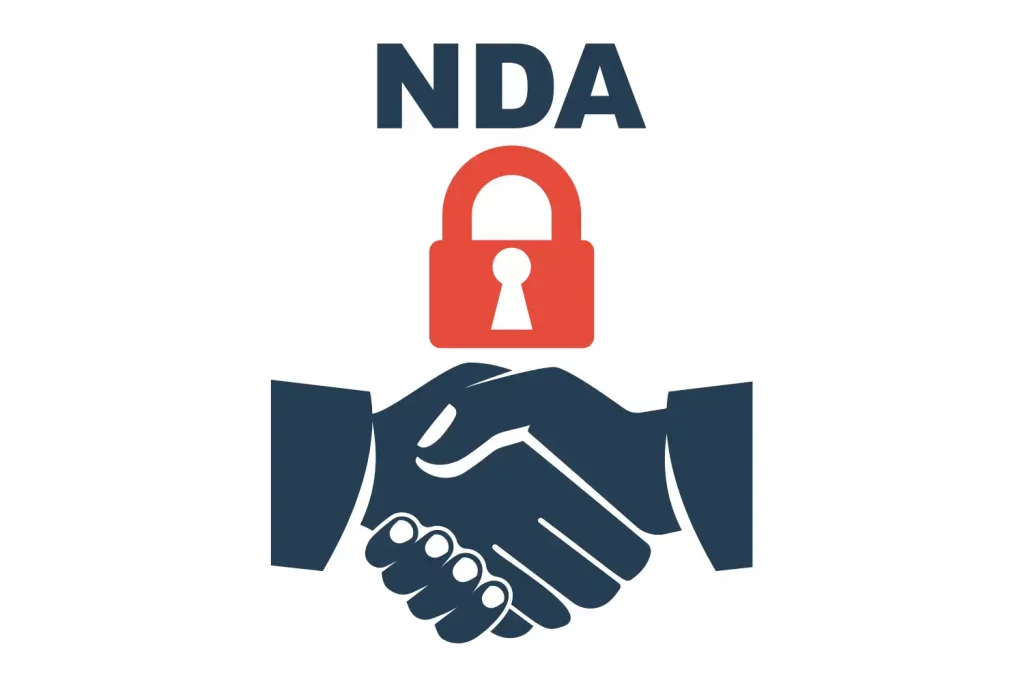Non disclosure and confidentiality agreements
Non-disclosure agreements are often referred to as NDA for short (Non-Disclosure Agreements) and are also known as confidentiality agreements and gagging orders. They are typically raised by employers who don’t want sensitive information about themselves or their businesses being made public.
Rated 4.8 Stars in Over 1,000 Reviews
Non-disclosure agreements in settlement agreements and employment contracts are powerful tools.
In recent years there has been an increasing number of well-publicised cases involving people who break these agreements and speak out.
In this updated version of our 2019 blog about Philip Green and gagging orders, we discuss non-disclosure agreements and what their benefits and drawbacks are for employees who sign them.
We will use the term ‘non-disclosure agreement’ here, rather than ‘confidentiality agreement’ or ‘gagging order’ but we are basically referring to the same thing.

What is a non-disclosure agreement?
Non-disclosure agreements in employment law most commonly refer to confidentiality clauses or gagging clauses in settlement agreements and/or employment contracts.
Here we focus on their use in settlement agreements, which are explained in detail in our main settlement agreements page.
As a brief recap, settlement agreements set out payments to be made to you by your employer as compensation when you leave your employment after you’ve been badly treated there.
They also include stipulations about things you can and can’t do after you’ve left your employment – such as not disclosing certain kinds of confidential or sensitive information (the subject of this article).
In return, you agree to leave your employment quietly and not to sue your employer for treating you badly or to make public any allegations against your employer.

What’s the difference between non-disclosure orders and non-disclosure agreements?
The term ‘non-disclosure order’ is sometimes referred to quite loosely as being the same thing as a non-disclosure agreement contained in a settlement agreement or employment contract. But there are in fact significant differences:
Non-disclosure orders or injunctions raised through a court
Non-disclosure orders or injunctions raised through a court are orders taken out by individuals or organisations.
They use the courts to stop another person from doing something or force them to do something that they don’t want to do.
The court order can be used to stop someone from speaking out publicly about a sensitive or confidential matter concerning a business and/or business practice.
This is the origin of the term ‘gagging order’ – which is what non-disclosure and confidentiality agreements are sometimes also called – the order gags you so you can’t speak out.
Typically, the order would be taken out by an employer against an employee or ex-employee.
Such injunctions can also be used to force someone to do something – such as handing over information about sensitive matters concerning an employer or business which may be in their possession.
Non-disclosure, confidentiality and gagging agreements
Non-disclosure, confidentiality or gagging clauses can form part of a wider legal agreement.
The person signing it agrees not to speak out publicly about matters considered to be sensitive, confidential and/or damaging by the person or organisation drawing up the agreement.
These clauses are typically agreed upon between an employer and an employee and may feature in an employment contract that you sign when you first join an organisation.
They can also be used in a settlement agreement drawn up when you leave employment following a dispute with your employer.
They are usually put in place to protect legitimate business interests, but they cannot prevent someone from reporting sexual harassment, discrimination or whistleblowing at work. (See below for more about this.)
When might you be asked to sign a non-disclosure agreement?
Your employer might ask you to agree to sign a non-disclosure agreement in return for a financial payout.
As already mentioned, this would most commonly be used to stop you from making information public that your employer thinks may damage their reputation and/or their business.
In such circumstances, you are given a payment in return for not taking the dispute to court or not speaking publicly about the issues outlined in the NDA.
You may also be required to keep confidential the terms of the agreement and the reasons behind its existence.
Examples of non-disclosure agreements and orders reported in the media
1: Harvey Weinstein
Harvey Weinstein was an American film producer who sexually assaulted some of his female employees. NDAs prevented those employees from speaking out about his criminal behaviour.
However, a former assistant to Weinstein broke the terms of her agreement and spoke publicly about her experience. This led to Weinstein being imprisoned for 23 years in 2020.
See this BBC report for further details.
2: Sir Philip Green
Sir Philip Green was head of the Arcadia retail group which included Top Shop and BHS. He initiated legal action in the form of a non-disclosure order against the Daily Telegraph.
The newspaper had uncovered sexual harassment and racial harassment allegations made against him by his employees. The victims were allegedly given large payouts to stop them from going public with their allegations.
Sir Philip dropped the court action, reportedly to save himself from further revelations and embarrassment. Although he had to foot a huge legal bill, he was never prosecuted for the allegations against him.
See these reports in The BBC for further details.
What are the benefits of signing a non-disclosure agreement?
If you sign an NDA or confidentiality agreement as part of a settlement agreement, you won’t usually get more money than if you took your case to an employment tribunal or other court.
However, what you will get is a degree of certainty. You’ll receive an agreed payment as a settlement and you can move forward with your life.
The uncertainty of litigation
With a tribunal or court case, there is always the ‘litigation risk’: the chance that you could lose.
Most sexual harassment or racism isn’t carried out in emails or in writing and is therefore very hard to prove.
But, if you enter into an NDA as part of a settlement agreement and get the money, you won’t have to worry about this risk.
Coping with publicity
Another advantage of non-disclosure/confidentiality agreements is that you don’t have to cope with the publicity often associated with many cases that end up in a tribunal or other law court.
Most people don’t want to feature in a court case lasting months or even years and become a public figure, bringing their bosses to account.
If that’s you, then signing an NDA is definitely preferable to a court case.
Covering the costs of a court case
Employment law legal aid was cut a long time ago. Therefore you need to consider how you can fund a tribunal or other court case should you lose it.
For further information, see our guide on the costs associated with tribunal cases

Dealing with the fallout of making public allegations
If you are well known yourself or the person you’re trying to claim against is well known, any court case will most certainly attract press attention.
You then become known as the person who was sexually harassed by so and so.
However, you most likely don’t want the general public or future employers to know this and to continue associating you with this element of your past.
We suggest that if you want to resign and get paid off, it should be acceptable to be paid for keeping quiet about it.
If you ban non-disclosure and confidentiality agreements entirely it’s likely that individual victims would get no compensation at all.
What if you want to break the terms of a non-disclosure agreement?
What if you sign a non-disclosure or confidentiality agreement but decide afterwards that you wish you hadn’t signed it?
What if you decide that you actually want people to know what really happened and so you speak out about it?
The people who paid you the money when you signed the agreement will have to consider whether or not to take you to court for breaking the agreement.
If they do take you to court, all the things they’ve done wrong will be scrutinised in public and so they will suffer from even more adverse reputational damage than you may have caused by speaking out.
So they will need to consider whether taking you to court is worth the time they will have to devote to a court case and the associated costs they will have to bear.
From the victim’s point of view, just the threat of being sued is normally enough to keep them quiet.
Role of a lawyer in drafting non-disclosure or confidentiality agreements
It’s also worth saying that in order to make one of these agreements legally binding within a settlement agreement, you have to take independent legal advice in the first place.
You can’t just be forced by your employer to sign one.
Your lawyer has to act as a third signatory and also advise you on:
- your rights
- the implications of the agreement
- whether or not you are being offered enough financial compensation for what has happened to you.
You could go public if you wanted to. Your employer might not come after you, but equally, they might. That is a real prospect.
So think very carefully before you sign a non-disclosure or confidentiality agreement and get some good legal advice before you do.
Important facts about non-disclosure and confidentiality agreements
If you are thinking of signing a non-disclosure or confidentiality agreement, whether it takes the form of a clause in a settlement agreement or is a free-standing agreement, you should be aware that:
- You have protection under the Public Interest Disclosure Act 1999 and that is not a right you can sign away in a settlement agreement
- The agreement does not prevent you or someone else from reporting potential crimes to the police
- It can’t be used to prevent you from reporting criminal acts or sexual abuse/harassment or discrimination to the police
- It cannot be used to prevent employees from whistleblowing in such cases as illegal practices and providing information to public authorities or regulators
- A written copy of the non-disclosure clause/agreement should be given to you upon request and you should ensure you are given a reasonable amount of time to seek legal advice about it.
Non-disclosure agreements – conclusions
The existence of non-disclosure agreements and settlement agreements that contain them has brought into the spotlight the unscrupulous behaviour of some employers.
These employers have behaved badly and then made their employees keep quiet about their bad behaviour by giving them large cash payments.
Campaigns like #metoo are to be welcomed as they have resulted in knowledge of these practices going global and in deceitful employers getting called out for this type of behaviour.
But we don’t think that non-disclosure and confidentiality agreements should be banned entirely without a proper incentive or alternative.
Next steps
If you have been asked by your employer to sign a non-disclosure or confidentiality agreement, do consult an employment lawyer before you sign.
If you are thinking of breaking an agreement that you have already signed, we urge you to consult an employment lawyer before you take any action.
Monaco Solicitors are experts in this field and can advise you on your best course of action.
To find out more about how we may be able to help you, contact us:
- via this link,
- phone 020 7717 5259, or
- email: communications@monacosolicitors.co.uk
Our related guides
- Settlement agreements in employment conflicts: How much should I get?
- Employment contracts: an employee guide
- Contracts for senior executives: Legal hotspots and potential disputes
- Philip Green & should gagging orders be banned?
- Sexual harassment at work
- Discrimination at work
- Whistleblowing
- Employment tribunals: An overview
- How to resign from employment

